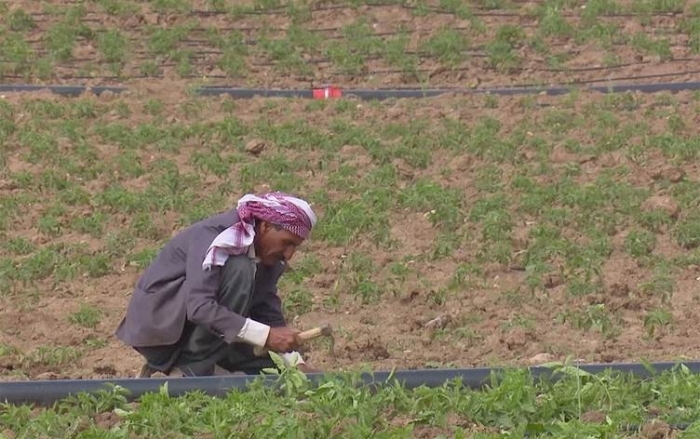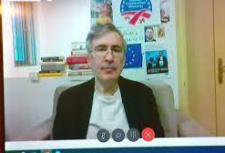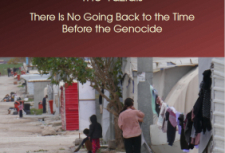Dry land worries Yazidi farmers

The lack of precipitation this winter is a concern for Syrian farmers and internally displaced persons who have planted crops around their camps, both in northeastern Syria and in Kurdistan.
In Syria, it has rained only three times since the beginning of winter, and local farmers have depended on wells. Farmers in Erbil and the Garmiyan plains face a similar challenge.
One of the Yazidi settlers said: "We have to irrigate them, but there is no water. It hasn't rained this year. It was God's will. Our crops have not grown, some people in the village have irrigation machines, and they water their fields, these fields look green, and everything else looks like red and barren land, where nothing grows, " said farmer Hassan Jali.
Farmers are resorting to growing new types of crops that do not require so much water.
"We received a new variety of wheat and tested it for two years. The harvest will be ready in five months. The best thing is to find new types of crops. We also hope for the help of international humanitarian organizations, " the farmer said.
Source ezdina
Tags:
Dry land worries Yazidi farmers

The lack of precipitation this winter is a concern for Syrian farmers and internally displaced persons who have planted crops around their camps, both in northeastern Syria and in Kurdistan.
In Syria, it has rained only three times since the beginning of winter, and local farmers have depended on wells. Farmers in Erbil and the Garmiyan plains face a similar challenge.
One of the Yazidi settlers said: "We have to irrigate them, but there is no water. It hasn't rained this year. It was God's will. Our crops have not grown, some people in the village have irrigation machines, and they water their fields, these fields look green, and everything else looks like red and barren land, where nothing grows, " said farmer Hassan Jali.
Farmers are resorting to growing new types of crops that do not require so much water.
"We received a new variety of wheat and tested it for two years. The harvest will be ready in five months. The best thing is to find new types of crops. We also hope for the help of international humanitarian organizations, " the farmer said.
Source ezdina
Tags:
NGOs suspend cooperation formats with gov't
...
26 Апрель 2024
EP backs resolution on transparency law in Georgia...
26 Апрель 2024
Celebration of Ayda Çarşemа Serê Salê in the temple T...
19 Апрель 2024
Yazidis celebrate Charsham Sarsale festival...
16 Апрель 2024
-
NGOs suspend cooperation formats with gov't
- US Department of State 2023 Human Rights Report on Armenia
- EP backs resolution on transparency law in Georgia
- Mikheil Saakashvili: This is not an ordinary election and we cannot act in an ordinary way - we need a unified list, everything should be postponed
- Irakli Kobakhidze: Joining the EU is the main foreign-political priority of Georgia and the Georgian people
- Report: The Yazidis – There is No Going Back to the Time Before the Genocide
-
Political groups in EP publish joint motion for resolution regarding Georgia
- Michael Roth: The Foreign Relations Committee of the Bundestag will discuss the internal political situation of Georgia
- Giorgi Vashadze: It was the hardest thing to listen to the discussion in the European Parliament, to listen to the statements that visa-free travel, candidate status may be revised, that sanctions may be considered
- The plight of Yazidi women in Sinjar Issues and Challenges after the ISIL genocide
- Nadia Murad statement on the arrest of two suspected ISIS members accused of enslaving Yazidi girls
- US State Department report: Judges vulnerable to political pressure when deciding cases involving politically sensitive topics or individuals
- Shalva Papuashvili: The age permitted for marriage - 18 years - will be written in the Constitution
-
GD to rally in front of Parliament on April 29 at supporters' request
- Another mass grave of Yazidis found in Shangal
-
SSG: No explosives found following counter-terrorism measures
-
Domestic Exports in January-March down by 21 percent
- Celebration of Ayda Çarşemа Serê Salê in the temple Taûsê Melek û heft Mêrê Dîwanê
-
Opposition parties announce "full mobilization" for 2nd reading of Transparency Law
-
Parliament receives President's veto on gender quota amendments to Election Code
- Armenia became the first country in the world to declare 3 August as the official day of remembrance of the Yezidi genocide
-
Parliament keeps yellow security level on April 18 amid tensions over Transparency bill
- Parliament adopts bill on Transparency of Foreign Influence with first reading
- Discussion of draft law "On transparency of foreign influence" to continue in first reading today
- Yazidis of Tbilisi celebrate the ancient holiday of Charsham Sare Sale
- The protest against the draft law "On the transparency of foreign influence" will be resumed at the parliament today, from 12:00
-
Georgia ranks 49th among 50 best countries in 2024 PPI
-
Legal Affairs Committee supports candidates to staff CEC
- Yazidis celebrate Charsham Sarsale festival
- Rally against draft law "On transparency of foreign influence" to resume near parliament from 12:00
-
Opposition MPs demand withdrawal of Transparency of Foreign Influence Bill
-
Georgian Parliament enforces yellow security level
- Armenian Parliament is going to establish a day of remembrance of the Yazidi genocide in Sinjar
-
PM: We offer Ambassadors of U.S., EU, and EU Member States to hold public discussions on Draft Law on Transparency of Foreign Influence
- World Monuments Fund restored the Yazidi temple of Mama Rashan
- Freedom House: Georgia has embarked on the path of semi-consolidated authoritarianism
-
EU Ambassador urges Georgia to accelerate progress on accession roadmap
-
Batumi named among top 20 European destinations for 2024
-
German police arrest Iraqi couple suspected of genocide for enslaving Yazidi girls
- Gocha Lordkipanidze became the chairman of the appeals chamber of The Hague Court
-
Ex-president Margvelashvili supports more protests, radicalization
- Stories from Sinjar: Wardiya’s Journey from Ruins to Resilience
-
TimeOut names Stepantsminda among 16 most beautiful small towns
- Mamuka Mdinaradze on the "Transparency of Foreign Influence" project: whoever you are, how can you criticize from Europe what was initiated in the European Parliament itself
- A British delegation visited the Yazidi temple of Lalesh
-
35 years passed since April 9 tragedy
-
Gov't familiarizes itself with CEC presentation on e-voting
- Media organizations issue statement regarding draft law "On transparency of foreign influence"
- Shamo Saido you can't make alliances in self-interest by shielding Yazidis
-
Georgian gov't announces tax amnesty for individual entrepreneurs
-
Seven opposition parties release joint statement on GD-initiated Foreign Financing Transparency Bill
-
PM appoints new Head of Intelligence Service
- Iraqi Yazidi organisations reject the 'Harmony Document' and demand justice and accountability for crimes committed against the Yazidi minority
-
Constitutional amendments on family values and minor protection registered in parliament
- Yazidis demand trial of Barzani family for impeding return to Sinjar
- Jim Risch, Jeanne Shaheen: The foreign agents law will harm Georgia’s transatlantic integration and its future in the European Union
-
MP Roman Gotsiridze: Time to turn to streets
-
Majority and opposition MPs clash in parliament
- Fighting for Justice and Supporting Victims of Sexual Violence in Conflict: An Interview with Nadia Murad for the Cambridge Journal of Law, Politics and the Arts
-
GD resubmits legislative initiative on foreign financing transparency
-
NBG warns customers of new swindling scams involving special programs like Any Desk
- Mamuka Mdinaradze: On behalf of the parliamentary majority, we would like to appeal to the ambassador to remove the sanctions imposed on the judges by the USA
- Efforts underway to revise Sinjar agreement amid social harmony declaration
-
Public Defender: Gender quota significant tool to eliminate discrimination
- Kakha Kaladze: Georgia is not a province or state of any country - we are independent, we have a constitution and everyone should be kind and respect our statehood
- Yezidi IDPs demand resignation of Iraqi Migration minister
- Giorgi Vashadze: Today, the first problem along with unemployment is low wages - I would like to address the representatives of Ivanishvili's party - why is it that you are getting rich and people are getting poorer?
- Irakli Kobakhidze: Religious diversity of Georgia is one of the main wealths of our country
-
GeoStat: Georgian economy up by 9.5 percent in February
- PM Barzani calls for global crackdown on ISIL terrorists
26 Апрель 2024
26 Апрель 2024
26 Апрель 2024
25 Апрель 2024
25 Апрель 2024
25 Апрель 2024
25 Апрель 2024
24 Апрель 2024
24 Апрель 2024
24 Апрель 2024
23 Апрель 2024
23 Апрель 2024
22 Апрель 2024
22 Апрель 2024
22 Апрель 2024
22 Апрель 2024
19 Апрель 2024
19 Апрель 2024
19 Апрель 2024
18 Апрель 2024
18 Апрель 2024
18 Апрель 2024
17 Апрель 2024
17 Апрель 2024
17 Апрель 2024
17 Апрель 2024
16 Апрель 2024
16 Апрель 2024
16 Апрель 2024
16 Апрель 2024
15 Апрель 2024
15 Апрель 2024
15 Апрель 2024
15 Апрель 2024
12 Апрель 2024
12 Апрель 2024
11 Апрель 2024
11 Апрель 2024
11 Апрель 2024
11 Апрель 2024
10 Апрель 2024
10 Апрель 2024
10 Апрель 2024
09 Апрель 2024
09 Апрель 2024
09 Апрель 2024
08 Апрель 2024
08 Апрель 2024
08 Апрель 2024
08 Апрель 2024
05 Апрель 2024
05 Апрель 2024
05 Апрель 2024
04 Апрель 2024
04 Апрель 2024
04 Апрель 2024
03 Апрель 2024
03 Апрель 2024
03 Апрель 2024
03 Апрель 2024
02 Апрель 2024
02 Апрель 2024
02 Апрель 2024
02 Апрель 2024
01 Апрель 2024
01 Апрель 2024
01 Апрель 2024
29 Март 2024
29 Март 2024
29 Март 2024
| APRIL | ||||||
|---|---|---|---|---|---|---|
| Mon | Tue | Wed | Thu | Fri | Sat | Sun |
| 01 | 02 | 03 | 04 | 05 | 06 | 07 |
| 08 | 09 | 10 | 11 | 12 | 13 | 14 |
| 15 | 16 | 17 | 18 | 19 | 20 | 21 |
| 22 | 23 | 24 | 25 | 26 | 27 | 28 |
| 29 | 30 | |||||


























